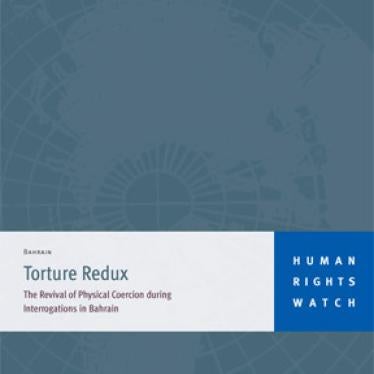Human Rights Watch held a news conference in Barhain in February to release a report on torture that I helped to research and write. Such an event publicizing serious human rights abuse in the Kingdom would not have been possible 10 or 15 years ago, a testament to the durability of some reforms and to persistent Bahraini human rights activism. In our investigations, we found solid evidence that torture, for the purpose of securing confessions, is back in the repertoire of Bahrain's General Directorate of Criminal Investigations. By all accounts, Bahrain had successfully ended the use of torture for a good part of the last decade.
It is therefore distressing that the government has refused to investigate, much less take action on, these documented abuses.
Bahrain is one of those Arab countries, like Morocco and Jordan, where son succeeded father to the throne a decade or more ago and ushered in reforms along with promises of full respect for fundamental human rights. All three of these "reforming monarchies" have demonstrated real limits to their reforming zeal, though, in basic areas like eliminating torture and ill-treatment of security suspects.
Our evidence in the Bahrain case, in addition to the consistency of the victim testimonies we took, consisted of court documents and reports of government medical examiners that consistently cited evidence of injuries consistent with the allegations of former detainees that they were suspended in painful positions and beaten. Many former detainees also alleged they had been subjected to electric shock devices. These findings as well as other human rights violations have also been documented in the State Department's 2009 Human Rights Report on Bahrain.
In a meeting shortly before our news conference, Shaikh Rashid bin Abdullah Al Khalifa, the minister of interior, told me that the ministry investigates all allegations of abuse, and would do so again. But neither his ministry nor the Ministry of Justice responded to our requests months ago for information about any investigations of torture allegations, and to date no officials have been able to cite a single such investigation.
After our report appeared, Foreign Minister Shaikh Khalid bin Ahmad Al Khalifa issued a statement saying that the government would examine the allegations and take "necessary actions" if violations were found. But the interior ministry's public statement flatly denied that any torture happened, and contended that such allegations were politically motivated, despite the abundant evidence presented in the report.
Because we were able to research and write the report at all, and to have discussions about it with government officials, I would dispute any claim that Bahrain has gone back to the "bad old days," when criticism of the government would get you fired from your job (if you were lucky enough to have one) and a lengthy jail term after an unfair trial in a State Security Court. Bahrain's State Security Courts are thankfully now history, and the margin for free expression, while not great, is better than it had been. But torture? Why is this terrible scourge once again a problem in Bahrain?
The abject failure of Bahraini authorities so far to investigate these allegations goes to the heart of why torture has once again raised its ugly head. For many decades, Bahrain had a deserved reputation as a country that systematically practiced torture. By 2005, the country could fairly claim to the UN Committee Against Torture that torture no longer occurred there. These were years of relative political calm. But starting in 2007, street protests over alleged discrimination against the majority Shia community became more frequent, and often deteriorated into clashes with security forces.
This was when we started hear, with disturbing regularity, allegations of systematic abuse. Some prosecutors referred those making these complaints to medical examinations by government doctors affiliated with the Public Prosecution Office. Other prosecutors, though, were consistently derelict in meeting their responsibility under Bahraini law to make such referrals.
And to our knowledge, in no case did the Attorney General, as head of the Public Prosecution Office, meet his responsibility under the law to conduct a criminal investigation into the allegations. In the face of persisting impunity for serious abuses, those abuses continue.
In my meeting with Shaikh Rashid, the minister of interior, he stressed the need for discipline in society, referring to the obligation of law enforcement officials to protect lives and property in the face of street unrest. I replied that I completely agreed, and that the absence of discipline and accountability underlies the revival of torture as security officials resort to earlier tactics for securing confessions at any cost.
This is what has to change, and the change has to come from the top.
American silence on the subject thus far, at least in public, makes such a needed change less likely, to the detriment of Bahraini citizens, global norms against torture, and American credibility as an advocate of human rights.
Joe Stork is the deputy director of Human Rights Watch's Middle East and North Africa division.







